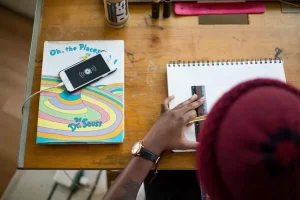
Imagine you are sitting in a classroom waiting for your grade on a big test.
You listened in class, you reviewed your notes the night before, you even read parts of your textbook.
You feel great about your grade.
Until you get your paper. Darn!
What went wrong?
That grade on the top of your test has nothing to do with how smart you are, but it does say something about your study habits. Fortunately, cognitive psychologists have been conducting painstaking research on effective learning techniques for decades.
Adam Putnam of Carleton College and his colleagues collected optimal learning techniques from research in cognitive and educational psychology. They reported the techniques in their paper on optimizing learning in college, published in Perspectives on Psychological Science.
Although the authors focus on performing well in college, you can start practicing these techniques in high school. And get yourself ready for the faster paced, more independent learning that’ll soon be expected of you.
Here’s a quick summary of their 9 scientifically proven learning techniques to help you learn more, study smarter, and get better grades.
1. Spread Out Your Studying Time
Research has shown that students learn more when they spread out their studying time rather than trying to cram it into one, long, late-night session. As tempting as it is to wait until the last minute to study, it takes time to transfer information from short-term to long-term memory.
2. Take Practice Quizzes
As if the actual test weren’t punishment enough, taking practice quizzes will show you the gaps in what you have learned. Answer the questions at the end of the chapter. Have someone quiz you on the information you have been studying, or try to teach it to another person.
For a bonus learning technique, try to answer questions about the topic before you learn about it, rather than waiting until after.
3. Temper Your Confidence
A lot of students struggle because they think they know more than they actually do. Too many students underestimate how quickly they will forget what they have already learned. Not saying you should have anxiety over every test, but be sure your confidence isn’t bigger than your preparation.
4. Organize Your Time
Remember how cramming is not actually learning? It’s also important to organize the time you do have. Set aside some time daily to review what you learned in class, read through your notes and…
5. Read Ahead
Grappling with the same information in different ways is one of the learning techniques that helps you move information from short-term to long-term memory. Reading ahead, even if you don’t understand everything that you read, will help you form meaningful pathways when the teacher covers the information in class.
6. Pay Attention In Class
This may seem like a simple task, but it’s especially tough when the weather is nice outside and you are stuck inside a classroom for the sixth class of the day. Still, take effective notes, listen to what the teacher is saying, and write down potential test questions during class.
That not only gives you a bank of review questions to draw from, the process of listening activates different parts of the brain than reading. Since your brain may make a connection at any time, you may remember something you heard, that you did not recall reading.
7. Write Your Notes Instead of Typing Them
With as much technology as we have available at our fingertips, it’s tempting to let our fingers do the work rather than resorting to pen and paper. You may want to resist that urge.
One recent study showed that students who type their notes rather than writing them may have recorded more information, but the students who wrote their notes by hand recalled more information. The problem is that typing allows you to capture everything without processing or understanding what you are typing. When you write by hand, you know you won’t be able to write everything which forces you to think about what to write in order to remember the concept.
8. Review the Information Immediately After Class
You may be tired when you get home, but be sure to take a few minutes to review what you learned about that day. Going back through your notes will give you a chance to fill in pieces you missed, and make note of areas you need to study at another time.
9. Study with a Friend
Studies have shown that there is something called the protege effect when you teach someone else the information you, yourself are trying to learn. In fact, students who try to teach another person about the subject they are learning about themselves actually learn faster and retain more information.
The next time you are stuck on how to do a math problem or how the water cycle works, try explaining it to another person. Even if you aren’t able to teach all of the concept, you will quickly see what you have yet to learn.
Studying better does not necessarily mean studying longer. If you get organized, study over time rather than trying to cram, and employ a few simple learning techniques, the next time you sit awaiting your graded test you will be pleasantly surprised.
Image Credit: StockSnap

Thank you Dr for your valuable input . This is very welcome for students to get a grip on what and how they are learning and improve their quality learning. Thank you.
Thank you, Vathsala. Glad you liked the post and found it useful.